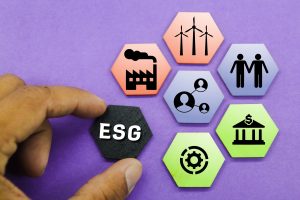
13 Apr Connecting ESG and Team Building for Stronger Teams and Sustainable Success
ESG. Try typing this acronym into Google: it produces more than 200 million results (!): everyone is talking about it, but perhaps not everyone knows what it really is.
So, what’s ESG?
 We can explain it to you in a simple way: ESG stands for Environmental, Social, and Governance. In short, for those of you who have never heard of it until now, it is a set of criteria that investors and other stakeholders use to assess a company’s sustainability and social impact.
We can explain it to you in a simple way: ESG stands for Environmental, Social, and Governance. In short, for those of you who have never heard of it until now, it is a set of criteria that investors and other stakeholders use to assess a company’s sustainability and social impact.
The ‘E’ in ESG refers to the environmental factors that a company considers in its operations, such as carbon emissions, energy efficiency and waste management. The ‘S’ refers to social factors, such as labour practices, diversity and inclusion and community engagement, while the ‘G’ refers to governance factors, such as board structure, executive compensation and ethical leadership.
Why are we hearing more and more about it?
Environmental, Social, and Governance (ESG) factors are becoming increasingly important for companies not only because they provide them with a framework for operating more sustainably and responsibly, but also because of their inherent potential to improve financial performance and build stronger relationships with stakeholders.
ESG factors, therefore, are becoming increasingly important for investors seeking to align their investments with their values and objectives. This is how companies that demonstrate strong ESG performance are seen as more attractive to investors, as they are perceived to be better positioned for long-term success and resilience.
And what does this have to do with us and team building?
Simple! One way that companies can embrace ESG is by connecting it to team building. Team building is an important part of any business, as it helps to foster communication, collaboration, and trust among team members. When done correctly, team building activities can help to break down walls, shorten distances and build stronger relationships between colleagues. However, team building can also be used as a way to promote ESG values within an organization.
 For example, a company might organize a team building event that focuses on environmental sustainability. By engaging in these types of activities, team members can learn more about the impact of their actions on the environment, and gain a greater appreciation for the importance of sustainability.
For example, a company might organize a team building event that focuses on environmental sustainability. By engaging in these types of activities, team members can learn more about the impact of their actions on the environment, and gain a greater appreciation for the importance of sustainability.
Moreover, team building can also be used as a way to promote good governance practices within an organization. This might involve organizing training sessions or workshops on topics such as ethical leadership, corporate governance, or responsible investing. By engaging in these types of activities, team members can gain a deeper understanding of the importance of good governance practices, and learn how to apply these principles in their own work.
By connecting ESG to team building, companies can not only promote important values and principles, but they can also build stronger, more effective teams. When team members are united around a common goal or purpose, they are more likely to work collaboratively and communicate effectively.
Contact us to know more about our Social activities
A team building for each letter:
E for Environmental
Many team building activities can be designed to be eco-friendly, meaning that they have minimal impact on the environment. In our case, several activities have been designed to meet this requirement:
- Vertical Garden
- Building birdhouses
- Eco-paper



By incorporating environmentally conscious team building activities into the workplace, companies can demonstrate their commitment to environmental sustainability and show that they are taking active measures to reduce their ecological footprint.
S for Social
Team building activities can also contribute to social sustainability by promoting diversity, equity and inclusion. Activities such as cultural exchange, group volunteering or diversity and inclusion workshops can create an inclusive workplace culture where team members feel valued and respected regardless of their background, race, gender or sexual orientation. To this end, we have developed several formats to help social cooperatives, children and people in need, such as Climbing Wall Construction and Social Cooking.


G for Governance
 Finally, team building activities can contribute to good governance by promoting transparency, accountability and ethical behaviour. Activities such as ethical decision-making simulations or team building exercises that encourage open communication and feedback can help build trust, increase transparency and promote a culture of responsibility.
Finally, team building activities can contribute to good governance by promoting transparency, accountability and ethical behaviour. Activities such as ethical decision-making simulations or team building exercises that encourage open communication and feedback can help build trust, increase transparency and promote a culture of responsibility.
A brand new activity we are promoting in this respect (particularly in our Italian office) is the redevelopment of degraded areas with the construction of an artificial pond.
This kind of team building activity is not only an opportunity to have fun and build relationships within the group, but also to work together on a meaningful social project. The redevelopment of a brownfield site is a challenge that requires teamworking and leadership skills to achieve its goals.
Take a look at our Social Activities
So ESG and CSR are the same thing?
Actually, no. ESG (Environmental, Social, and Governance) and CSR (Corporate Social Responsibility) are two concepts that are often mistakenly used interchangeably, but actually have different meanings.
- CSR refers to the voluntary actions of a company to improve its social and environmental impact. It can include initiatives such as community engagement or sustainability reporting. This is generally seen as a way for companies to go beyond legal requirements and create a positive impact on society.
- ESG, on the other hand, is a set of criteria that investors use to assess the sustainability and ethical impact of a company. ESG factors include environmental practices, labour standards, supply chain management and board diversity. ESG is often seen as a way for investors to assess a company’s long-term financial viability and risk management.
While CSR focuses on a company’s voluntary actions, therefore, ESG focuses instead on its sustainability performance as a key factor in its economic success. The substantial difference, therefore, lies in the final goal. CSR can be seen as one component of ESG, but ESG encompasses a broader range of factors.
All the good reasons to book now your Team Building Event!
In short, by promoting ESG values through team building, companies can build stronger relationships with stakeholders, including customers, employees, investors and communities. When stakeholders see that a company is committed to ESG values, they are more likely to trust and support the company. This can lead to greater brand loyalty, customer satisfaction and investor trust.
In conclusion, all those listed above are good reasons to implement ESG in the company. Doing it with a Team Building is even easier and more fun! We would like to remind you that ESG is an important framework for companies to operate more sustainably and responsibly, and team building is an important tool for building stronger and more effective teams.
By linking ESG to team building, companies can promote important values and principles, build stronger relationships with stakeholders, create a more sustainable and resilient business and contribute to creating a more sustainable world.
Contact us to know how to link your Team Building and ESG

